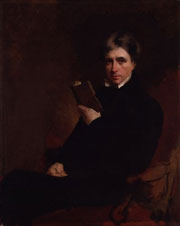
James Leigh Hunt
Table-Talk
The Singing Man Kept by the Birds
「1851」 「James Leigh Hunt」, “Singing Man Kept by the Birds,” in Table-Talk to Which are Added Imaginary Conversations of Pope and Swift 「Google Books」 (1851; London, 1865) 182-4.
A traveler came into an unknown country where the people were more like birds than men, and twice as tall as the largest ostriches. They had beaks and wings, and lived in gigantic nests, upon trees of a proportionate size. The traveler, who was unfortunately a capital singer, happed to be indulging in one of his favourite songs, when he was overheard by a party of this monstrous people who caught him and carried him home. Here he lead such as made him a thousand times wish for death. The bird family did not seem to be cruel to one another, or even intentionally so to him; for they soon found out what he liked to eat, and gave him plenty of it. They also flattened him a corner of the nest for a bed; and were very particular in keeping out of his way a pet tiger which threw him into the most dreadful agitations. But in all other respects, whether out of cruelty or fondness, or want of though, they teased him to death. His habitation, at best, was totally unfit for him. His health depended upon exercise, particularly as he was a traveler; but he could not take any in the nest, because it was hollow like a basin; and had he attempted to step out of it, he would have broken his neck. Sometimes they would handle him in their great claws, till his heart beast as if it would come through his ribs. Sometimes they kissed and fondled him with their horrid beaks. Sometimes they pulled his nose this way and that, till he gaped and cried out for anguish; upon which they would grin from ear to ear, and stroke back his head, till the hairs came out by roots. If he did not sing, they would pull his arms about, and cruelly spread out his fingers, as if to discover what was the matter with him; and, when he did sing to beguile his sorrows, he had the mortification of finding that they looked upon it as a mark of his contentment and happiness. They would sing themselves (for some of them were pretty good singing-birds for so coarse a species), to challenge him, as it were, to new efforts. At length our poor traveler feel sick of a moral distemper, the termination of which was luckily hastened by the modes they took to cure it. “Wretch that I am!” cried he, in his last moments, “I used to think it unmanly to care about keeping a goldfinch, or even a lark; but all my manliness, in a like situation, can not prevent me from dying of torture.” (182-4)



